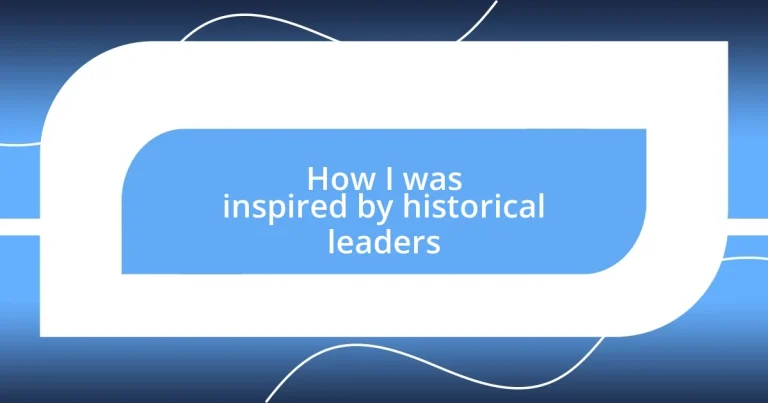Key takeaways:
- Historical leaders like Nelson Mandela and Martin Luther King Jr. exemplify key qualities such as vision, adaptability, and integrity, which are essential for effective leadership.
- Reflecting on the lessons learned from great leaders emphasizes the importance of resilience and empathy in overcoming challenges and fostering trust within teams.
- Taking action on inspiration transforms ideas into impactful projects, highlighting the need for proactive leadership and the courage to pursue one’s values and vision.
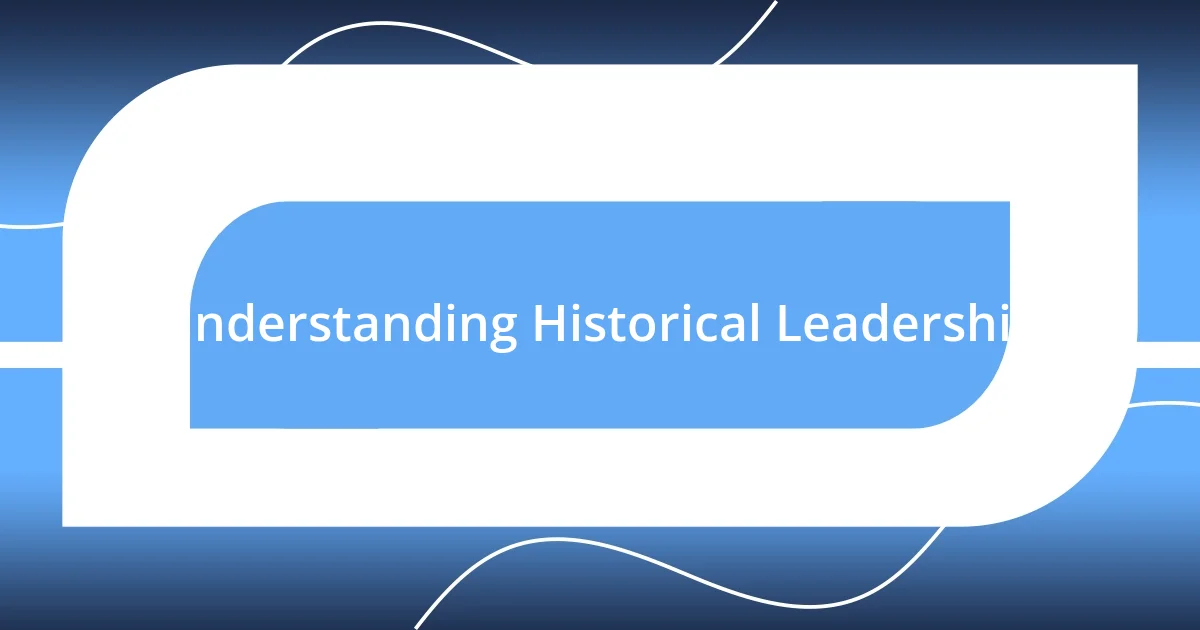
Understanding Historical Leadership
Historical leaders provide a fascinating lens through which we can explore the complexities of human behavior and decision-making. I remember diving into biographies of figures like Nelson Mandela and Winston Churchill, captivated by how their backgrounds shaped their leadership styles. Was it their trials, perseverance, or innate vision that propelled them to greatness, or was it a combination of all these factors?
As I reflect on these leaders, I feel a deep admiration for their ability to unite people during tumultuous times. It’s remarkable how their personal stories of struggle and triumph resonate with folks from all walks of life. For instance, Mandela’s relentless fight against apartheid wasn’t just about politics; it was about human dignity and connection. How often do we see leaders today embody such profound empathy and resilience?
Studying historical leadership also reveals the importance of context. Each leader operated within unique social, political, and economic environments that shaped their choices. I often find myself wondering how my own leadership experiences would have differed had I faced similar challenges. How would I have responded in the heat of their pivotal moments? These reflections deepen my understanding of historical leadership and inspire me to become a more effective leader in my own journey.
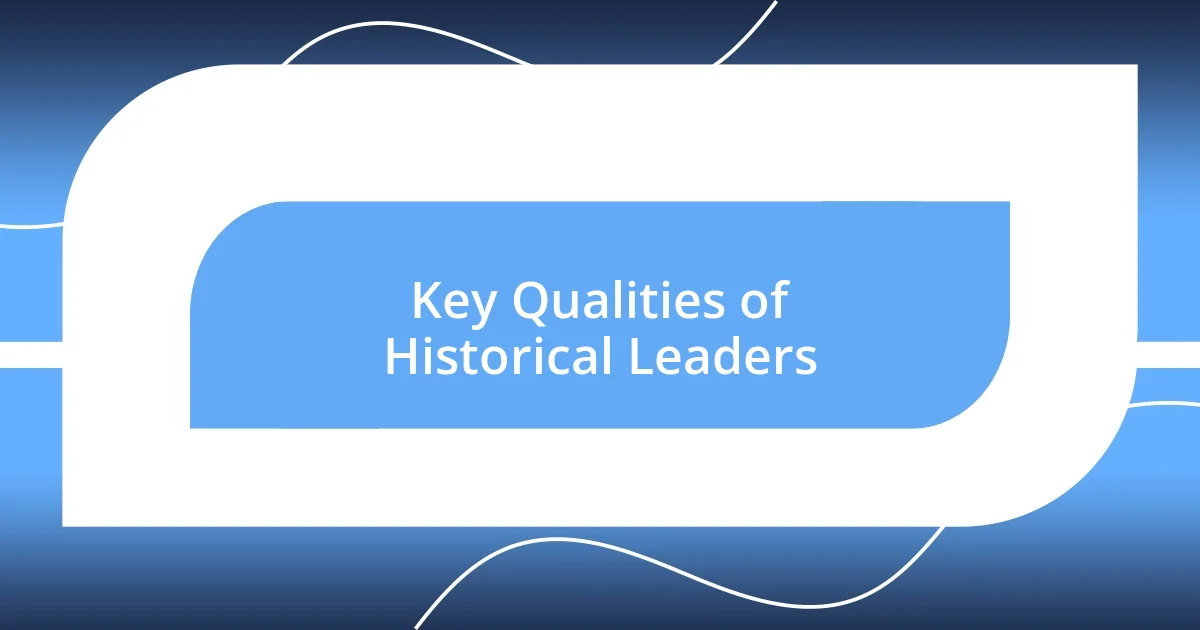
Key Qualities of Historical Leaders
Historical leaders often share key qualities that define their effectiveness and resilience in challenging circumstances. For example, one of the most striking qualities is their vision. I can recall reading about Martin Luther King Jr., whose powerful vision of equality sparked countless movements worldwide. His ability to articulate a better future inspired not just those in his time but continues to motivate generations. Reflecting on that, I sometimes wonder: How can I cultivate a clearer vision in my own leadership endeavors?
Another crucial trait is adaptability. Leaders like Abraham Lincoln faced immense pressure and change, yet they adjusted their strategies to meet the moment. I remember a time in my career when a sudden shift in market conditions required me to quickly pivot my approach, much like Lincoln did during the Civil War. Witnessing such adaptability in respected leaders reminds me to remain flexible and open to change during my own challenges.
Lastly, strong historical leaders possess unwavering integrity. When I think of figures like Mahatma Gandhi, his steadfast commitment to non-violence and truth remains a powerful lesson in ethical leadership. I often reflect on whether I’m embodying those same principles in both my professional and personal life. Integrity isn’t just a quality; it’s a foundation upon which credible leadership is built.
| Quality | Description |
|---|---|
| Vision | The ability to articulate and inspire a hopeful future. |
| Adaptability | Flexibility in response to changing circumstances and challenges. |
| Integrity | Commitment to ethical principles and moral values. |
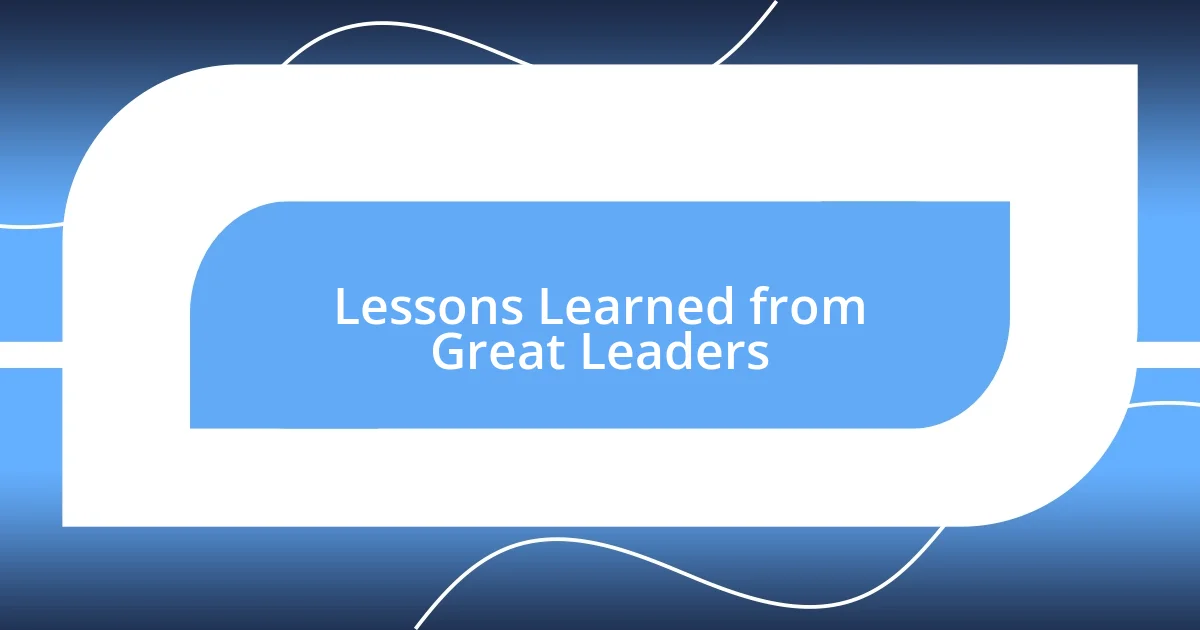
Lessons Learned from Great Leaders
Reflecting on the lessons learned from great leaders, I often find it both enlightening and humbling. One lesson that stands out to me is the power of resilience. I remember facing a difficult project at work where everything seemed to go wrong. In those moments, I thought about how leaders like Winston Churchill persevered through the darkest days of World War II. His famous words, “Success is not final, failure is not fatal: It is the courage to continue that counts,” echo in my mind, reminding me never to lose hope in adversity. Resilience is more than just bouncing back; it’s an act of embracing challenges while remaining anchored to one’s purpose.
- Resilience: Overcoming obstacles through unwavering determination.
- Empathy: Understanding and addressing the needs of others.
- Vision: Creating a clear and inspiring future goal.
- Integrity: Upholding principles even when faced with adversity.
Another profound lesson I’ve absorbed from historical leaders is the importance of empathy in leadership. I recall a time I had to mediate a conflict between team members. Channeling the compassion exemplified by leaders like Nelson Mandela, I focused on listening genuinely to both sides. Mandela’s ability to connect with others’ pain and aspirations is something I deeply admire. It helped me realize that empathy isn’t just a soft skill; it’s a strategic advantage that fosters trust and collaboration within teams. In my experience, when leaders prioritize understanding over judgment, they create an environment where everyone feels valued and empowered.
- Empathy: Relating to others and fostering a supportive environment.
- Collaboration: Working together towards a common goal.
- Inspiration: Sparking motivation in those around you through shared vision.
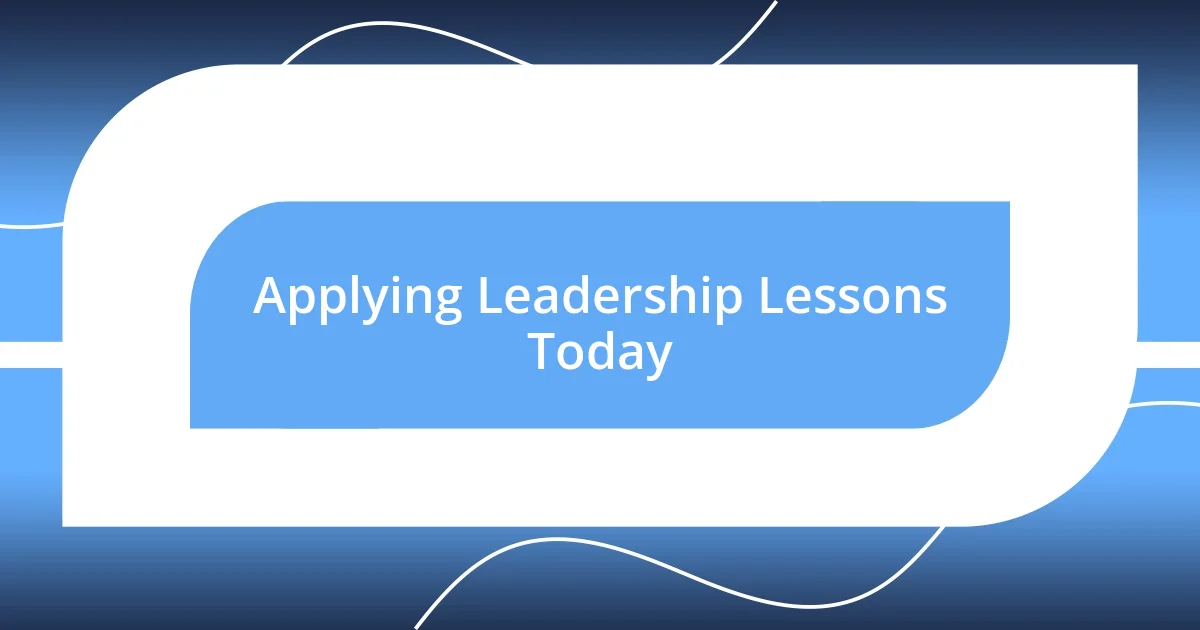
Applying Leadership Lessons Today
When it comes to applying the leadership lessons I’ve absorbed, I’ve found the key qualities of adaptability, empathy, and resilience demand constant practice in my daily life. For example, I recently navigated a project failure that initially felt like a setback. In that moment of frustration, I recalled Thomas Jefferson’s perspective on learning from mistakes. This experience reminded me that every challenge holds lessons; it’s about how we choose to redefine our paths that truly matters.
Empathy is another quality I actively strive to embody. Not long ago, a colleague confided in me about their overwhelming workload. Instead of giving a quick fix, I chose to sit down and really listen, feeling the weight of their stress. This moment reinforced in me the belief that fostering a caring atmosphere within a team is just as impactful as driving results. I often ask myself: How can I promote an open dialogue that encourages vulnerability and support in my work environment?
Finally, the necessity of resilience shines through in how I approach daily obstacles. There was an incident last year when a key client abruptly ended their contract with us, and the team felt the wind leave their sails. Drawing inspiration from figures like Oprah Winfrey, who often speaks about overcoming adversity, I encouraged my team to view this as an opportunity for growth. By reframing the situation, we transformed our setback into a stepping stone, igniting our creativity anew. This experience led me to ponder: How can embracing failures pave the way for innovative solutions moving forward?

Developing Personal Leadership Style
Developing a personal leadership style has been a journey for me, shaped significantly by the historical figures I admire. I often think about how Abraham Lincoln’s willingness to evolve his views reflected a deeper understanding of leadership—it’s about growth. This makes me wonder: Are we, as leaders, open to adapting our perspectives when faced with new information? In my experience, being flexible has allowed me to connect more deeply with my team, ultimately fostering a culture where everyone feels empowered to contribute their thoughts without fear of judgment.
As I explored qualities that resonate with me, I recognized the importance of integrity, especially when difficult decisions arise. I recall a time when I had to choose between meeting a tight deadline or ensuring the quality of work produced. Inspired by leaders like Mahatma Gandhi, I opted for the latter and communicated openly with my team about the situation. It was a challenging conversation, but I believe maintaining our ethical standards not only earned me respect but also strengthened our collective trust. How often do we prioritize short-term gains over long-term values, and what might the consequences be?
One of the most empowering aspects of developing my leadership style has been embracing the vision. I often draw inspiration from leaders who had a clear purpose, like Martin Luther King Jr. His ability to articulate a dream ignited a movement, and it encourages me to share my own vision with clarity and passion. I vividly remember a moment during a team meeting when I shared the future I envisioned for our project. The excitement in the room was palpable, as team members began to see their roles as integral to bringing that vision to life. It makes me reflect: What would happen if all leaders dared to dream out loud, inspiring those around them?

Crafting Your Inspirational Narrative
Crafting your inspirational narrative requires looking inward and reflecting on the experiences that have shaped you. I often find that the most powerful stories emerge from moments of vulnerability or triumph. For instance, I remember a time I stood up to lead a team presentation. With a knot in my stomach, I thought of Winston Churchill’s rallying speeches—his conviction pushed me to share my ideas sincerely. That experience taught me how authenticity resonates with others; it’s not just about the facts we present but the feelings we evoke.
As I weave my narrative, I also consider the stories that influenced me. For example, when I think about Rosa Parks, her quiet yet powerful act of defiance stirs something deep within me. It reminds me that sometimes, the simplest actions can lead to monumental changes. This connection drives me to seek out my own moments of courage, wondering how small decisions can ripple out to inspire others. Have you considered how your choices, no matter how small, might impact those around you?
Furthermore, I believe that sharing struggles is just as important as acknowledging successes. I recall the challenging months when I was transitioning into a leadership role and faced skepticism from my peers. Reflecting on leaders like Nelson Mandela, who overcame their own obstacles, I began to communicate my vulnerabilities. By doing so, I not only fostered trust among my team but also created an environment where we could collectively learn and grow. How can our shared stories of struggle unite rather than divide us?

Taking Action on Your Inspiration
Taking action on your inspiration is where the real magic happens. I remember the moment I decided to lead a community project inspired by the commitment of leaders like Mother Teresa. I organized a local charity drive, pouring my heart into connecting with volunteers and spreading the word. The sense of purpose that blossomed within me was exhilarating. Have you ever felt that spark when a simple idea transforms into a rallying call for others?
My experience taught me the importance of staying proactive. One evening, while reflecting on the resilience of historical figures like Rosa Parks, I realized I was sitting on my hands, waiting for opportunities to arise. That night, I drafted a proposal for a mentorship program at our workplace. The act of putting pen to paper ignited a new vision, and it felt like I was stepping into my own story. Isn’t it fascinating how just a shift in mindset can propel you from being a bystander to a leader in your own life?
Moreover, I’ve learned that passion breeds action. When I began my journey to advocate for mental health awareness, inspired by leaders like Bell Hooks, it wasn’t easy. But I channeled my fears into organizing workshops and open discussions. Each conversation left me feeling more connected to my values, reminding me that taking action is often born from vulnerability. How often do we let our fears hold us back instead of paving the way for meaningful change?












